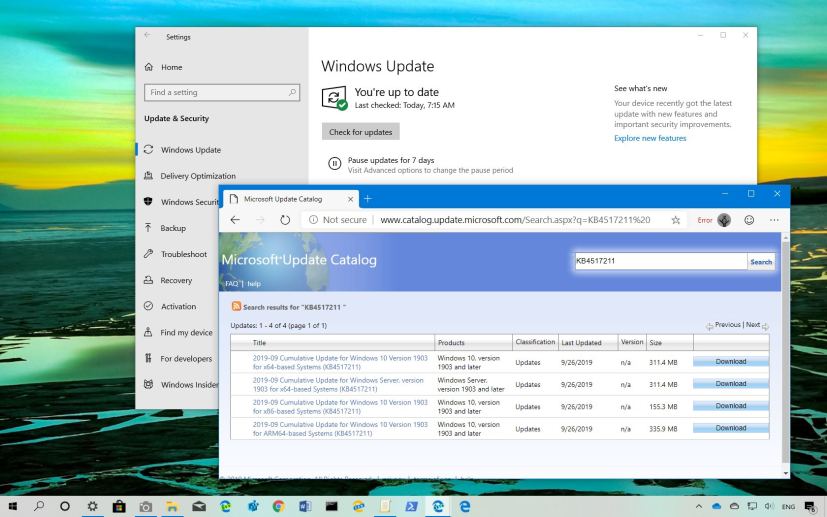Microsoft has released update KB4517211 to address a slew of issues with devices running the Windows 10 May 2019 Update, version 1903.
KB4517211 bumps the version number to build 18362.387, and according to the company, addresses recently reported problem with certain games to be quieter or different than expected. And it fixes an issue that could cause the screen color to turn white on displays with high-dynamic-range (HDR). In addition, the update fixes problem for older systems trying upgrade to new version of the operating system, as well as VPN, font, audio playback and recording problems.
Update KB4517211 for Windows 10 version 1903
Microsoft has announced KB4517211 in the Windows support site, and it’s referred as “September 26, 2019—KB4517211 (OS Build 18362.387)” If you’re already running the Windows 10 May 2019 Update on your device, this update will address these problems:
- Addresses an issue that causes vertical fonts to be larger when printing to a PostScript printer.
- Fixes a problem that causes printing from 32-bit applications to fail with an “Access is denied” error when you select Run as different user for the application.
- Addresses an issue that may give write access to a removable USB disk when a user switches from a privileged user to an unprivileged user.
- Fixes a problem that causes the lsass.exe service to stop working, which causes the system to shut down.
- Addresses an issue that gives a Windows Hello for Business user two certificates for authentication during certificate renewal instead of one certificate.
- Fixes a problem that prevents a web browser from connecting securely to Windows Server. This occurs when using a client authentication certificate, such as a SHA512-based certificate, and the web browser does not support a signature algorithm that matches the certificate.
- Addresses an issue that may cause authentication to fail for certificate-based authentication when the certificate authentication includes a cname as part of the pre-authentication request.
- Fixes a problem that prevents a Microsoft App-V application from opening and displays a network failure error.
- Addresses an issue that causes a query request of the Win32_LogonSession class for the StartTime to display the value of the epoch (for example, 1-1-1601 1:00:00) instead of the actual logon time.
- Fixes a problem that causes File Explorer to show a regular file icon for files marked with FILE_ATTRIBUTE_OFFLINE instead of the expected placeholder icon.
- Addresses an issue with intermittent virtual private network (VPN) disconnections on cellular networks.
- Fixes a problem that may cause audio playback and recording to fail when connecting to a remote virtual machine.
- Addresses an issue with MSCTF.dll that causes an application to stop working.
- Fixes a problem with the input and display of special characters that occurs when an app uses imm32.dll.
- Addresses an issue with resizing Windows Presentation Foundation (WPF) applications; they may not respond to being resized using the mouse until you release the mouse button.
- Fixes a problem that may prevent older systems from upgrading to the latest operating systems because of an error in the display driver of older versions.
- Addresses an issue that may cause the screen color to turn white on laptops that have built-in, high-dynamic-range (HDR) screens.
- Fixes a problem with converting an application from 32-bit to 64-bit architecture.
- Addresses an issue that prevents you from running the Active Directory Diagnostics Data Collector Set from the Performance Monitor for Domain Controllers.
- Fixes a problem that causes audio in certain games to be quieter or different than expected.
- Addresses an issue that prevents Microsoft App-V from handling a parameter of the CreateProcess API properly, which prevents the virtual process from opening.
- Fixes a problem in which the maximum central processing unit (CPU) performance is not enabled when you select the High Performance power plan.
- Provides a way to configure the read buffer size. This allows you to address an issue with slow upload times when uploading a file to a Universal Naming Convention (UNC) share using the Internet Information Services (IIS) Web Distributed Authoring and Versioning (WebDAV) feature.
- Fixes a problem that causes a device to stop working when opening files from a network drive that has client-side caching enabled.
- Facilitates the configuration of devices that are managed by mobile device management (MDM) settings, which are created by ADMX ingestion.
Download September 2019 update for Windows 10
This update is available immediately, it’ll download and install automatically, but you can always force the update from Settings > Update & Security > Windows Update and clicking the Check for updates button. You can find more details about the most recent updates in the Windows 10 update history.
You can download the updates to install them manually with the links below:

